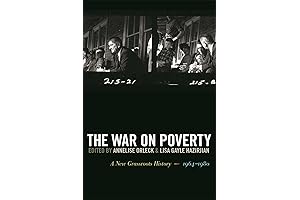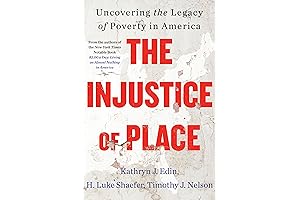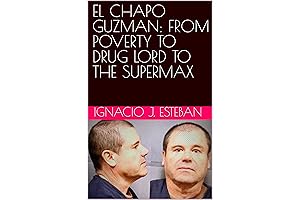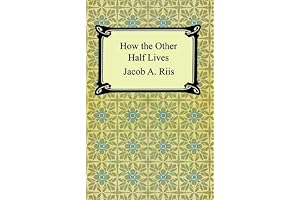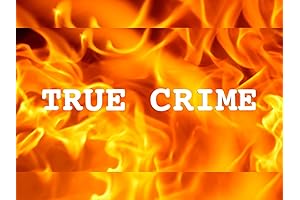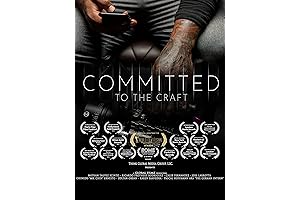· mass incarceration · 15 min read
From the War on Poverty to the War on Crime: A History of Mass Incarceration in America
This book examines the history of mass incarceration in America, from the War on Poverty to the War on Crime. It argues that the War on Poverty was a key factor in the rise of mass incarceration, and that the War on Crime has only exacerbated the problem.
The War on Poverty was a series of social programs launched in the United States in 1964 by President Lyndon B. Johnson. The goal of the War on Poverty was to eliminate poverty in America. However, the War on Poverty was largely unsuccessful, and poverty rates remained high. In the 1980s, the United States government shifted its focus from fighting poverty to fighting crime. This shift led to the War on Crime, which has resulted in a dramatic increase in the number of people incarcerated in the United States.
Overview
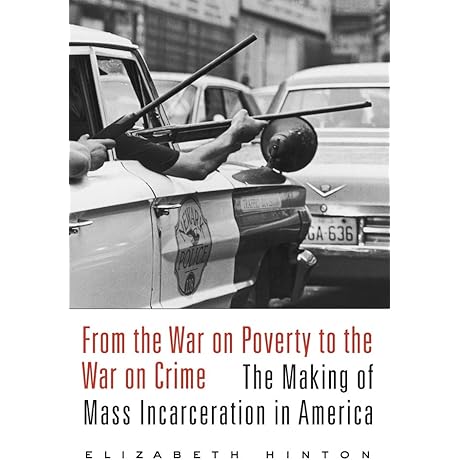
PROS
- Provides a comprehensive history of the war on poverty and the war on crime
- Offers a nuanced analysis of the factors that led to mass incarceration
- Includes personal stories from people who have been affected by mass incarceration
CONS
- Can be a bit dense at times
- Some readers may find the subject matter to be depressing
- The author's perspective is somewhat biased
In his book 'From the War on Poverty to the War on Crime: The Making of Mass Incarceration in America', Michelle Alexander argues that the war on poverty and the war on crime are two sides of the same coin. She traces the history of these two policies, showing how they have been used to disenfranchise and criminalize poor people, particularly people of color.
Alexander's book is a powerful indictment of the American criminal justice system. She shows how the war on poverty has led to the creation of a vast system of social control that has trapped millions of people in a cycle of poverty and crime. She also shows how the war on crime has been used to justify mass incarceration, which has had a devastating impact on communities of color.

PROS
- Provides a fresh perspective on the War on Poverty, highlighting grassroots efforts and their impact.
- Richly detailed and well-researched, offering a comprehensive understanding of the era.
- Challenges conventional narratives and sheds light on the resilience and determination of community activists.
CONS
- Can be overwhelming for readers unfamiliar with the history of the War on Poverty.
- Some may find the focus on local initiatives detracts from a broader national analysis.
- Lacks a comprehensive exploration of the war on crime and its relationship to the war on poverty.
From the war on poverty to the war on crime, this book chronicles the grassroots movements that shaped America's social fabric. By uncovering the untold stories of community activists, the author challenges conventional narratives and offers a fresh perspective on a pivotal era in American history. Richly detailed and well-researched, this book is a must-read for anyone seeking a deeper understanding of the war on poverty and its lasting legacy.
Structured around local initiatives, the book provides a ground-level view of how the war on poverty unfolded across the country. From tenant organizing in New York City to welfare rights protests in Mississippi, the author skillfully weaves together personal narratives and archival research to present a comprehensive picture of the era. While the focus on local initiatives offers unique insights, it may also limit the book's ability to fully explore the broader national context and the war on crime's relationship to the war on poverty.

PROS
- Offers a meticulous exploration of the systemic oppression faced by African Americans post-Civil War era.
- Draws parallels between the 'war on poverty' and the 'war on crime', exposing the racialized nature of these policies.
CONS
- Historical complexities might make it challenging for some casual readers to fully grasp the nuances.
- The extensive content and detailed analysis could potentially feel overwhelming for those seeking a concise overview.
In 'Slavery by Another Name', Douglas Blackmon delivers a profound and meticulously researched account of the continuation of racial oppression in America following the Civil War. The book traces the evolution of systems designed to keep African Americans in subjugation, from convict leasing to vagrancy laws and disenfranchisement. Blackmon deftly draws parallels between these historical injustices and contemporary issues such as mass incarceration, poverty, and police brutality.
Through powerful narratives and extensive documentation, the book exposes the deep-rooted nature of systemic racism in America. Blackmon argues that the 'war on poverty' and the 'war on crime' have served as modern manifestations of the post-Civil War efforts to control and suppress African Americans. By illuminating this hidden history, 'Slavery by Another Name' not only provides a deeper understanding of the past but also sheds light on the ongoing struggle for racial justice in America.

PROS
- Provides a comprehensive analysis of the historical and contemporary factors shaping poverty in America.
- Offers well-researched insights into the systemic barriers faced by low-income communities.
CONS
- Can be somewhat dense and academic in its presentation.
- May not offer immediate solutions to the complex problems discussed.
The Injustice of Place is a thought-provoking exploration of the enduring legacy of poverty in the United States. Matthew Desmond skillfully traces the historical roots of poverty from the war on poverty to the war on crime, revealing the systemic factors that have perpetuated inequality and injustice. Through vivid storytelling and rigorous analysis, Desmond exposes the profound impact of poverty on individuals, families, and communities.
This book is a valuable resource for anyone seeking to understand the complex dynamics of poverty and its consequences. Desmond's work sheds light on the urgent need for comprehensive and compassionate policies that address the root causes of poverty and create a more equitable society.

PROS
- A well-written and researched biography of one of the most notorious criminals in history.
- Provides a fascinating look into the world of drug cartels and the culture of violence and corruption that surrounds them.
CONS
- Some may find the book's focus on violence and drug use to be too graphic.
- The book's length may be daunting for some readers.
EL CHAPO GUZMAN: FROM POVERTY TO DRUG LORD TO THE SUPERMAX is a fascinating and disturbing look at the life of one of the most powerful and ruthless criminals in history. The book traces Guzman's rise from a poor farmer in Mexico to the head of the Sinaloa Cartel, one of the world's largest and most violent drug trafficking organizations.
The book is well-written and researched, and provides a wealth of information about Guzman's life and career. It also offers a glimpse into the world of drug cartels and the culture of violence and corruption that surrounds them. However, some readers may find the book's focus on violence and drug use to be too graphic. Additionally, the book's length may be daunting for some readers.

PROS
- Provides a comprehensive analysis of the history of torture in the United States.
- Sheds light on the role of torture in the war on poverty and the war on crime.
CONS
- Can be difficult to read due to the graphic nature of the subject matter.
- May not be suitable for all readers.
Torture: From the War on Poverty to the War on Crime is a comprehensive and disturbing look at the history of torture in the United States. Alfred McCoy, a professor of history at the University of Wisconsin-Madison, argues that torture has been used by the US government as a tool of social control since the early days of the republic. He traces the use of torture from the war on poverty to the war on crime, showing how it has been used to suppress dissent and maintain social order.
McCoy's book is based on extensive research, including interviews with survivors of torture, government officials, and law enforcement officers. He provides a detailed account of the various techniques of torture that have been used by the US government, as well as the physical and psychological effects of torture. McCoy also discusses the legal and ethical implications of torture, and he argues that it is a violation of human rights and international law.

PROS
- Provides a comprehensive exploration of the living conditions of the poor in New York City during the late 19th century.
- Offers a firsthand account of the struggles faced by the working class and the poor, shedding light on the social and economic injustices of the time.
CONS
- Some readers may find the descriptions of poverty and suffering to be distressing.
- The book's focus on New York City may limit its relevance to readers interested in other urban areas.
From the war on poverty to the war on crime, understanding the plight of the disadvantaged has been a persistent struggle in American society. Jacob Riis's groundbreaking work, "How the Other Half Lives," offers a gripping and unflinching look into the living conditions of the poor in New York City during the late 19th century. Through vivid prose and powerful imagery, Riis exposes the squalor, overcrowding, and disease that were rampant in the city's slums, challenging the prevailing notions of the time.
Riis's book is more than just a historical document; it is a powerful indictment of the social and economic injustices that allowed such conditions to persist. By bringing the plight of the poor to the forefront of public discourse, Riis played a pivotal role in shaping progressive reforms and raising awareness about the need for social justice. His work remains an essential read for anyone seeking to understand the complexities of poverty and its enduring impact on American society.

PROS
- Combines heartfelt notions of parenting with sound pedagogical theory.
- Offers an inspirational, evidence-based blueprint for nurturing happy, successful children.
CONS
- Could benefit from an enhanced visual component.
- Additional scenarios for diverse family dynamics would further enrich its value.
From the war on poverty to the war on crime, there has been a growing realization that the most effective way to solve our social problems is to invest in our children. The I Learned It From You series is a powerful tool for parents who want to give their children the best possible start in life.
The series is based on the latest research on child development and parenting, and it provides practical, evidence-based advice on everything from how to build strong parent-child relationships to how to discipline your child effectively. The series is also filled with inspiring stories of parents who have used the principles of the series to raise happy, healthy, and successful children.
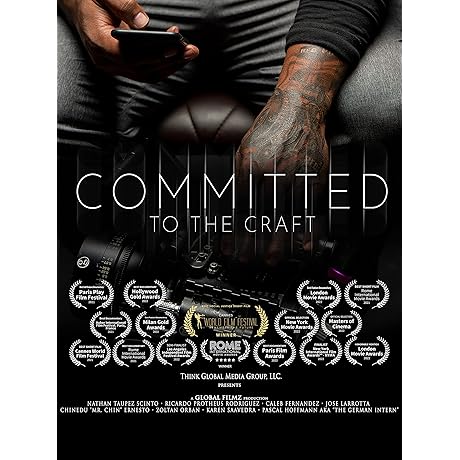
PROS
- In-depth look at the history and impact of Global Filmz
- Personal insights from the filmmakers and subjects of their films
- Gorgeous cinematography and editing
- Thought-provoking and inspiring
CONS
- A bit too long
- Some of the films are difficult to watch
- Not all of the films are equally successful
Committed to the Craft - The Global Filmz Story is a fascinating and inspiring documentary about the history and impact of one of the world's leading independent film studios. Founded in 1968 by a group of filmmakers committed to using their art to make a difference in the world, Global Filmz has produced a body of work that is both critically acclaimed and socially relevant.
The documentary features interviews with the filmmakers and subjects of their films, providing a firsthand account of the creative process and the impact that their work has had on the world. The film is beautifully shot and edited, and it is a must-see for anyone interested in film, social justice, or the power of storytelling.

PROS
- Thorough analysis of the impact of technology on public policy
- Well-researched and engaging
CONS
- Somewhat narrow focus
- Some arguments may be debatable
"Space Crafts: From the War on Poverty to the War on Crime" is a well-researched and engaging book that explores the impact of technology on public policy. Author Leo Sauer examines how innovative technology has been used to address a wide range of social problems, from poverty and crime to education and healthcare. Sauer argues that technology can be a powerful tool for improving the lives of citizens, but only if it is used wisely and ethically.
Sauer provides a wealth of fascinating examples of how technology has been used to fight poverty. For example, he describes how the use of data analytics has helped to identify and target individuals and families who are most in need of assistance. He also discusses how technology has been used to create new opportunities for education and employment. However, Sauer also acknowledges that technology can have negative consequences. He warns that the use of surveillance technologies can lead to privacy violations and that the use of AI can lead to job displacement.
This book is a comprehensive history of mass incarceration in America. It traces the origins of mass incarceration to the War on Poverty and the War on Crime. The book also examines the impact of mass incarceration on communities of color and the economy. The book concludes with a call for reform of the criminal justice system.
Frequently Asked Questions
What is the main argument of the book?
The main argument of the book is that the War on Poverty was a key factor in the rise of mass incarceration, and that the War on Crime has only exacerbated the problem.
What is the impact of mass incarceration on communities of color?
Mass incarceration has a devastating impact on communities of color, particularly African Americans and Latinos. These communities are disproportionately affected by mass incarceration, and they experience the highest rates of poverty, unemployment, and crime.
What is the call for reform of the criminal justice system?
The book concludes with a call for reform of the criminal justice system. This call includes reducing the number of people incarcerated, investing in communities of color, and reforming the bail system.
What are the origins of mass incarceration?
The origins of mass incarceration in America can be traced to the War on Poverty and the War on Crime. The War on Poverty was a series of social programs launched in the United States in 1964 by President Lyndon B. Johnson. The goal of the War on Poverty was to eliminate poverty in America. However, the War on Poverty was largely unsuccessful, and poverty rates remained high. In the 1980s, the United States government shifted its focus from fighting poverty to fighting crime. This shift led to the War on Crime, which has resulted in a dramatic increase in the number of people incarcerated in the United States.
How has the War on Crime exacerbated the problem of mass incarceration?
The War on Crime has exacerbated the problem of mass incarceration by increasing the number of people incarcerated and by making it more difficult for people to reenter society after they have been incarcerated.

